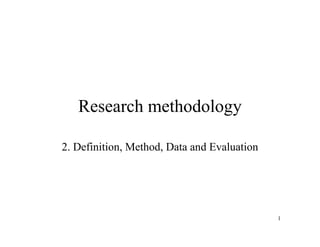
Research Methodology: Defining Problems and Collecting Data
- 1. Research methodology 2. Definition, Method, Data and Evaluation 1
- 2. The research cycle 2
- 3. First step: Problem formulation • Typical problems (in applied empirical science...): – explain something observed • why did this happen • what are the motives for – evaluate effect of something • new policy or new organisational form – find out what characterise something • description, propose a typology) – analyse what is the best way to do something given certain goals • but based on observed relations – predictions • must also be based on observed relations • Very important: Is this a problem where it is possible to get useful information? 3
- 4. • Problem should be clearly formulated – relations to problems discussed in literature – relations to practical situation in firms/organisation... – formulated in clear terms • a clear term: A term where application is uncontroversial? • special problem: Value loaded terms 4
- 5. Definitions (1) • Definitions never an end in itself • meaning can be clear enough even if we cannot define the term.. • Define a term in two situations: • term not known to the audience • term given different interpretations by different people • A good definition: • uses terms that is clear and known by the audience! • e.g. not circular • Important to separate controversies related to facts from controversies about whether a certain term can be applied to these facts • “what happened on the market” vs “is it correct to apply the term bubble to this event” 5
- 6. Definitions (2) • Different kinds of definitions: – Stipulative definitions (the usual ones in science) • this is how I use the term – Descriptive definitions • this is how a certain group of people use the term – Operational definitions • relate to how measure • Sometimes do not exist a set of necessary and sufficient conditions for applying a certain term – The idea of “family resemblance”: A network of overlapping similarities characterise what falls under a term 6
- 7. Next steps • How to get data/information • "Research design" • Evaluation of data in relation to hypothesis/statement 7
- 8. Data sources • Existing data from registers, statistical authorities, etc • Interviews • Questionnaires • What to choose: – perhaps combination? • How to design – see special literature! – logical order, clear terms, etc: check earlier theses 8
- 9. Data quality • Reliability – would you get the same data of you replicated the study/measurement • interview answers depend on who asks • result on questionnaire depend on exact formulation or when questionnaire was made – check in a systematic way.. • Validity – does the data say anything about what we are interested in • does registered unemployment say anything about who really is unemployed • are they telling the truth? • What do we do with “outliers”? 9
- 10. Research design Control event (to some degree...) • Classical experiment: – randomly selected groups from same population – one group “treated” in a certain way • Experiment/test: What happens if.... : – two conflicting theories – implicit control group? 10
- 11. Observe without any control....... 1. Quasi-experimental method - try to find group that can be used as a control group, compare result 2. Collect data with the purpose of statistically identifying relationships 3. Case study method - try to identify possible relations and mechanisms in specific case, comparisons Not very clear borders between methods! 11
- 12. How many observations do you need? • See next part! • Depend upon what you want to know – small difference, large difference – how it is, how it can be – tendency... • Generalizations never possible! – at least according to some philosophers • Certain knowledge not possible! – at least according to some philosophers 12
- 13. Evaluation of hypothesis in relation to evidence • General perspective: Same situation as a judge that evaluate evidence in order to make judgement – very seldom conclusive evidence • Is there a statistical relation (correlation) – How likely is that we would observe a correlation if there is no relation? – Measures of statistical significance – Depends upon • number of observations • how strong the relation is and how exact you want to measure it 13
- 14. • From statistical relation to causal relation: Is this really the cause? – Is there a plausible mechanism relating cause and effect? – Is the relation robust • over time • over space • when we change the form of statistical function (linear, nonlinear) • If there are competing plausible hypotheses that both fit the facts? – Try to find some situation where the hypotheses give different implications? Collect data about this situation? 14
- 15. • A bayesian approach: How probable is a certain hypothesis? – Start with apriori probability • related to background theories, credibility of the person, competing theories – Collect new information – Revise probabilities • given an evaluation of the quality of the information • how likely is the evidence given each competing hypothesis? – strong support if unlikely given competing theories 15
- 16. • Can explain why scientific changes usually takes time • If “old” theories have high prior probability it takes a lot of information to lead to a revision. Always problems with a specific study. • If difficult to get data competing theories can coexist for long periods of time. • Difference between social and natural science that both stronger prior probabilities and more difficult to get good data in social science? 16
- 17. Concluding comment • Important to have a consistent plan! • Important to collect data that you know that you can draw any conclusions from given the questions you are interested in • No "hard" data, no clear line between qualitative and quantitative methods 17
